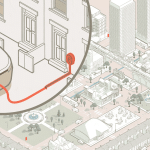What pundits say: “Joe Biden is, at the moment, losing his reelection campaign,” wrote The Atlantic‘s Annie Lowrey in a piece this week. “And he is doing so while presiding over the strongest economy the United States has ever experienced.”
Lowrey cites the low jobless rate—under 4 percent!—and higher wage growth than we experienced during Barack Obama’s administration. “Inflation has cooled off considerably,” she adds, “meaning that consumers’ purchasing power is strong.”
This argument isn’t unique. Pundits have, of late, been scratching their heads trying to figure out why President Joe Biden is polling so poorly when the recession never really materialized, and inflation was tamed (even if that means interest rates must remain high for a while longer). Some of this may be due to the fact that the economic indicators are actually all over the place, and do not paint a consistently rosy picture despite the credit many are attempting to give Biden.
Making sense of it all: Sure, unemployment is low. And inflation has been decently tamed—to 3.5 percent, per March data. But, it doesn’t feel great to most voters because a) it was via the Federal Reserve hiking interest rates that made it so inflation could be tamed, and b) 3.5 percent still seems high to most people because the average annual rate of inflation was quite low for pretty much all of the ’90s and 2000s (with the exceptions of 2008 and now). In other words: It’s still more expensive to buy basic goods than people are accustomed to, and it’s much more expensive to borrow money than before. This affects people’s behavior (home sales slowed a lot in 2023, for example), and it certainly affects their sentiment.
Also, quite shockingly, voters don’t seem to like being lied to: Biden said inflation was “at 9 percent when I came in, and it’s now down around 3 percent,” in an interview with Yahoo Finance earlier this week (a claim he keeps making!) Actually, inflation was 1.4 percent when Biden took office—a fact any half-wit can easily find by Googling—and it’s the massive increase in government spending (under the guise of COVID-19, during both the Biden and Donald Trump presidencies) that led to the predictable result of high inflation.
So it’s not just that inflation remains highish, or that interest rates are high, but it’s also that the guy in charge keeps trying to act like nobody could’ve possibly predicted or prevented this. That’s not true.
To make matters worse, economic indicators are just kind of broadly all over the place and hard to make sense of. Home and car insurance premiums have surged; car repair prices are higher than they’ve generally been. Wages have risen and stayed high in some industries. But when, say, we’re talking about high wages for mechanics, those costs get passed on to consumers in some form (via higher prices, generally).
It’s all just quite funky right now, and it will be interesting to see whether Biden gets dinged for this at the ballot box (though Trump too shares plenty of blame).
Scenes from New York: The city, which has been providing free shelter to any migrant newcomers who seek it, is attempting to get the situation under control by starting a new round of evictions.
Since the start of 2022, more than 200,000 migrants have taken advantage of New York’s right-to-shelter policy. Currently, roughly 65,000 migrants are housed at taxpayer expense.
“Under the city’s previous rules, adult migrants could stay in shelters for 30 days, after which they could simply reapply and receive a bed for another 30 days, no questions asked,” reported The New York Times. “That has allowed a number of migrants to languish in the shelter system for months, sometimes for more than a year, reapplying for a bed indefinitely.”
Now, the city will crack down on single adults and families of adults (but not families with young children), forcing them to move elsewhere after 30 days unless they can prove extenuating circumstances in a manner that satisfies city officials.
QUICK HITS
“Sales of US existing homes unexpectedly fell for a second month in April, adding to evidence that the resale market is struggling for traction amid near-record prices and high borrowing costs,” reported Bloomberg. (Interestingly, “sales of new homes in the US bounced back broadly in March as an abundance of inventory helped drive prices lower.”) “Employers plan to hire 5.8% fewer new graduates than they did last year, according to a spring survey of 226 employers by the National Association of Colleges and Employers,” reported The Wall Street Journal. “Some companies say AI is taking over part of the work fresh graduates used to do.” The New York Times is really trying to ding Supreme Court Justice Samuel Alito for flying problematic flags. Just one issue: The case that these flags are concerning is extraordinarily weak. I made two threads breaking down why this stat (thread No. 1), and the Washington Monthly article are worth rejecting (thread No. 2):
Today, more Americans consume marijuana — which is still illegal federally and in 26 states — than consume alcohol, which is of course legal ~everywhere. pic.twitter.com/kx8FyNNSRd
— Charles Fain Lehman (@CharlesFLehman) May 22, 2024
Legislators in Illinois just passed a bill to legally change the term offender to justice-impacted individual. The term “would only apply to participants in one program meant to rehabilitate people and keep them out of prison,” per WGN9. “It’s costing thousands and thousands of dollars just to do a name change,” one legislator objected. “Change this, change that, the only thing you don’t want to change is the behavior of criminals,” said state Sen. Steve McClure (R–Springfield). “Even Portland is sick of soft-on-crime prosecutors,” wrote the editors at National Review.
The post Why Is the Economy So Weird Right Now? appeared first on Reason.com.







